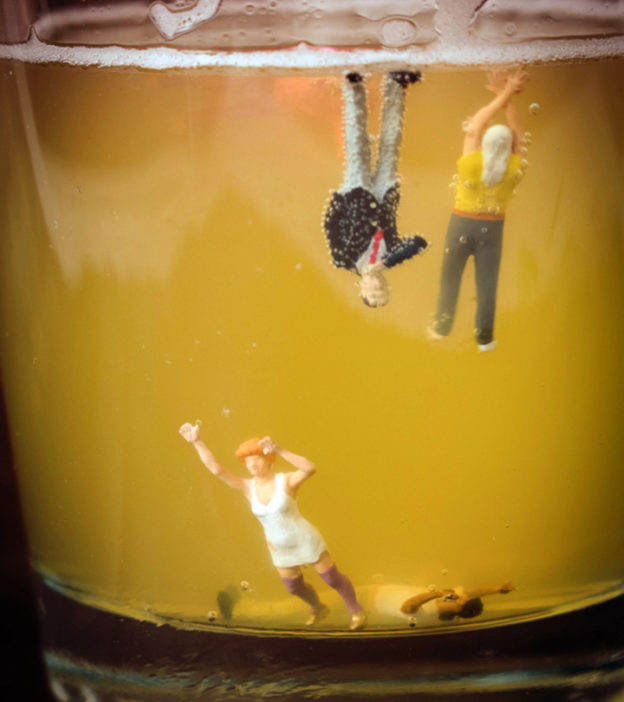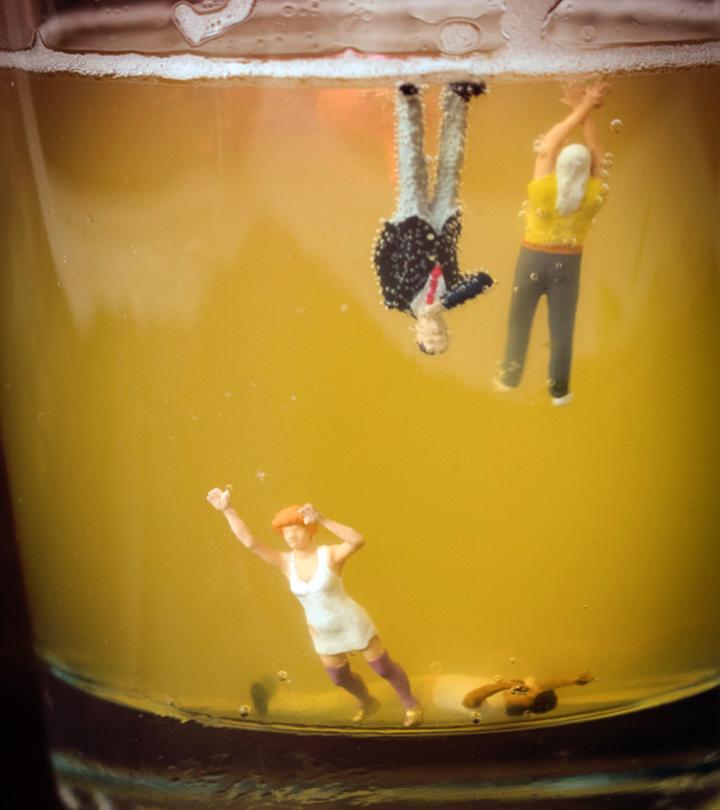
Image: Shutterstock
Teenage binge drinking in the US has been reported to vary from 11 to 14 percent by various national surveys. The legal drinking age in the US is 21 years, and underage drinking is a major reason for physical, psychological, and social problems in the youth (1). According to the National Survey on Drug Use and Health by SAMHSA, 8.3% of people aged 12 to 20 had reported having indulged in binge drinking within one month.
This post highlights the risks of binge drinking among teenagers and discusses ways to help prevent it.
What Is Binge Drinking?
The National Institute on Alcohol Abuse and Alcoholism (NIAAA) defines binge drinking as a situation where blood alcohol concentration (BAC) reaches at least 0.08 grams per 100 milliliters of blood within two hours of consuming alcohol (2). It means consuming five or more drinks for men and four or more drinks for women. However, recent research shows children may reach BAC limits after fewer drinks than adults.
For boys aged:
- 9 to13 years: About 3 drinks
- 14 to15 years: About 4 drinks
- 16 to 17years: About 5 drinks
For girls aged:
- 9 to 17 years: About 3 drinks
As per the National Survey of Drug Use and Health, drinking patterns vary by age and gender. Among adolescents aged 12-13, fewer than one in hundred reported binge drinking and about one in ten engaged in binge drinking among those between 16-17. As can be inferred from the graph below, binge drinking is more prevalent among adolescent girls than in boys.
A comparison of U.S. boys and girls: Past month binge drinking
 Did you know?
Did you know?Why Do Teens Binge Drink?
The transition from childhood to adolescence involves physical and emotional changes. Increasing independence may itself contribute to irrational drinking. Other reasons may include the following (3) (4).
- The impulsive, thrill-seeking behavior of the developing teen brains may be attracted to experimenting with alcohol and excessive drinking.
- Adolescents generally see drinking as a pleasurable experience and are more likely to drink in excess.
- A teen’s brain appears to be particularly sensitive to the positive effects of drinking, such as feeling more at ease in social situations than the adverse effects such as drowsiness, lack of coordination, and hangover (felt more by adults).
Image: Shutterstock
- Risk of binge drinking is high in youth who are aggressive, hyperactive, depressed, withdrawn, or anxious.
- In their attempt to be accepted by their peers, adolescents often end up in social events, parties, concerts, or parties where they are exposed to alcohol. School and college students often get introduced to alcoholic beverages by seniors. If drinking is a typical activity for the peer groups, and binge drinking is perceived as a social norm, they are much more likely to binge drink.
- Children with several family members who are alcoholics are also at greater risk of alcohol-related problems, such as binge drinking.
- Various media or advertising influences may unintentionally project binge drinking as “cool” or fun.
 Quick fact
Quick factImage: Shutterstock
What Are The Risks Of Binge Drinking In Teens?
Binge drinking may have several negative consequences to the physical, psychological, and social well-being of teens. The short-term and long-term effects of alcohol may include the following.
1. Effect on brain development
The adolescent brain is not fully mature, and binge drinking may affect its development. Studies have identified faulty growth of gray and white matters of the brain structure. Teenage brain responses controlling verbal learning, working memory, and risk-taking may also be affected.
Binge drinking has also been linked to risky behavior or decision-making and reward response that persists in adulthood. Teens who binge drink are at greater risk of developing alcohol use disorder (AUD/ alcoholism/alcohol dependence) later in life (5).
2. Risk of accidents
Binge alcohol consumption significantly increases the risk of injuries such as falls, burns, and drownings. The reason is that alcohol diminishes the mind’s senses, responses, and decision-making abilities due to impaired judgment. Underage drinking is responsible for the deaths of about 5000 people below 21 years of age each year in the US (6).
A state of intoxication also makes teens more likely to indulge in unprotected sexual activities. This can result in an increased risk of teen pregnancy and sexually transmitted diseases (STDs).
3. Alcohol poisoning
Image: Shutterstock
Consuming large amounts of alcohol in a short period of time may cause alcohol poisoning. Excessive alcohol can progressively shut down brain areas that control breathing, heart rate, and body temperature, causing permanent brain damage or even death. The symptoms of alcohol poisoning may include (7):
- Mental confusion
- Slow or irregular breathing
- Decreased heart rate
- Losing conscious
- Seizure
- Dulled responses, such as no gag reflex that increases the risk of choking
- Clammy skin
- Extremely low body temperature
4. Other substance abuse
Young people are more likely to use substances, such as tobacco, marijuana, and other illicit drugs, when under the influence of alcohol (4).
 Research finds
Research findsWhat Can Be The Other Consequences Of Binge Drinking In Teens?
Image: Shutterstock
Teens who binge drink may experience various problems that affect their day-to-day life and development (1). These problems may often be signs of underage drinking.
- Headache, nausea, vomiting, shakiness, and hangover
- Weak memory
- Higher absence rates and low grades at school
- Lack of participation in sports or other productive youth activities
- Legal issues such as arrest for driving or hurting others when drunk
- Increased likelihood to engage in physical violence and sexual assault
- Disrupted normal growth and sexual development
How To Prevent Teenage Binge Drinking?
Parents and teachers can go a long way in reducing the risk factors that lead to binge drinking in teenagers (8) (9).
- Children tend to learn by imitating adults such as parents and caregivers. Parents must avoid drinking in front of children and if they need to, then drink in moderation. Never drink and drive.
- Make sure teens do not have access to alcohol at home. Have a separate refrigerator with a lock if you need to keep the beverage cold.
- Talk to your child and encourage open communication. Listen to your teen’s opinion about alcohol. Try sharing your knowledge about the legal and health consequences of underage drinking and addiction.
- Encourage them to discuss any stress or tension bothering them. Assure them support as a family and seek medical support if required.
- Talk to your teen about their peer group or social circle. Ask them about their friends. You may even invite them for lunch and know more about them.
- Set rules and plan strategies for success. Discuss ways of handling peer pressure and how to say no to alcoholic beverages.
Image: Shutterstock
- Work with other parents from your child’s peer group to monitor their place of gathering and activities. Being vigilant and implementing appropriate interventions is the key to children’s safety.
- Encourage them to attain positive achievements at school and look for opportunities to contribute to their community through education. If the teen receives praise and satisfaction from other healthy activities, they may be less likely to turn to alcohol.
1. What do I do when my teen comes home drunk?
Things to do when your teen comes home drunk (10):
- Monitor their breathing and don’t let them fall asleep drunk
- Give water to keep them hydrated and have them sober up
- If you notice any strange behavior such as not breathing or being zoned out, call an ambulance
- Once they’ve sobered up, talk to them and know if something is wrong in their life.
2. Is it okay to binge drink occasionally for teens?
It may not be wise to binge drink since it may increase the risk for (10):
- Alcohol poisoning
- Accidents while walking or driving
- Verbal and physical abuse
- Nausea and vomiting
- Unprotected sexual intercourse
3. Which age group is most likely to be binge drinkers?
According to CDC, binge drinking is most commonly seen within the age group of 18 to 34 (11). Also, it is observed to be more common in men than in women.
Teenage binge drinking is a problem whose effects ripple through adulthood. Parents, caregivers, and teachers should identify the warning signs of underage drinking. Adolescent binge drinking is preventable with proper communication with youngsters, awareness, and if required, medical assistance such as rehabilitation, counseling, or seeking help from psychologists or other trained professionals (3).
Infographic: How Does Binge Drinking Affect Teens?
Teens may indulge in binge drinking due to several factors, including peer pressure, exposure to an alcoholic family member, and seeking a thrilling experience. However, the consequences of binge drinking can be worrisome. Check out the infographic below to understand the impact of binge drinking on teens.

Illustration: Momjunction Design Team

Key Pointers
- Binge drinking is a condition where teens consume excessive alcohol.
- The reasons for binge drinking may include depression, societal or peer pressure, family history of alcoholism, pleasure-seeking, etc.
- However, this behavior is associated with risks such as altered brain responses, accidental pregnancy, alcohol poisoning, and the use of other illicit substances such as marijuana and tobacco.
- You may prevent this habit in your teens by setting success strategies, encouraging open talks, reducing access to alcohol, and encouraging them for positive achievements.
Binge drinking as a teen can have serious consequences. The video below shares critical information about the risks of it. Equip yourself with insights and strategies to ensure safety.
